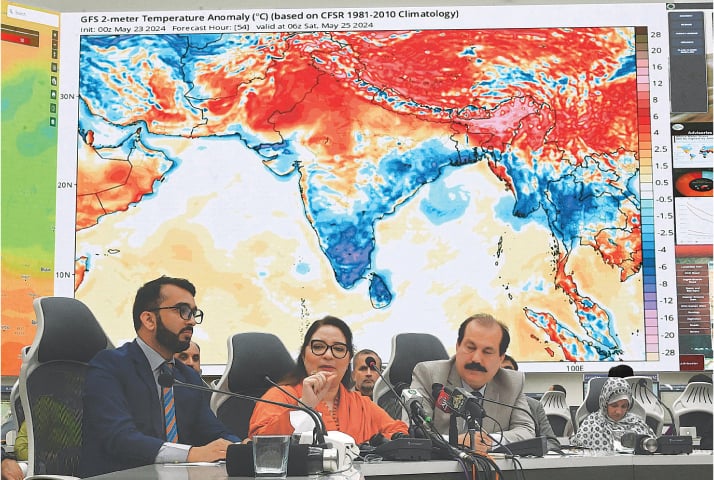As scorching temperatures persist across nearly 26 districts of Pakistan since May 21, the Ministry of Climate Change cautioned on Thursday that the current heatwave, slated to last until May 30, is just the initial onslaught, with two more waves anticipated in June. Blaming unsustainable environmental practices and deforestation for the extreme conditions, Romina Khurshid Alam, the PM’s coordinator on climate change, urged federal and provincial departments to mobilize resources to safeguard citizens, particularly vulnerable groups like children and the elderly.
Referring to data from the Pakistan Meteorological Department, Alam highlighted that temperatures in most regions are currently 5 to 6 degrees Celsius above normal, with 26 districts in Punjab, Sindh, and Balochistan grappling with severe heatwave conditions. These conditions are forecasted to persist in three waves throughout the summer, with the ongoing wave from May 22-30, followed by subsequent waves in early and late June. According to the state-run APP, the second heatwave is expected from June 7-8, and the third during the last week of June.
Ms. Alam underscored the significance of comprehensive guidelines and early warnings to mitigate heatwave-related casualties, recalling the deadly 2015 heatwave that claimed nearly 2,500 lives. She emphasized that human-induced factors, including deforestation and unsustainable environmental practices, exacerbate heatwave crises, urging ongoing public awareness campaigns through various media outlets to educate people on health risks and preventive measures.
In an effort to avert heatwave casualties, Alam advised the public to minimize unnecessary outdoor activities, particularly for vulnerable groups, while the NDMA works on early warnings and coordinates with provincial departments to manage natural disasters and calamities.
Expressing concern over the heatwave’s impact on glacier melt and forest fires, Alam cautioned against discarding flammable materials in national parks and emphasized providing water access to workers to prevent heat-related emergencies.
Dr. Tayyab from the NDMA highlighted Pakistan’s vulnerability to climate change, emphasizing the agency’s disaster calendar projecting natural calamities for the next six months. He pointed out recent erratic weather patterns leading to rainfall variations and underscored water stress and drought risks during heatwaves, particularly in regions like Tharparkar and Jacobabad.
Responding to media inquiries, Alam confirmed the establishment of a high-level committee by the PM to coordinate efforts across relevant authorities on climate-related challenges. NDMA’s Mahsud announced the development of a mobile application to provide real-time alerts and disaster management plans, ensuring comprehensive disaster preparedness and response.
